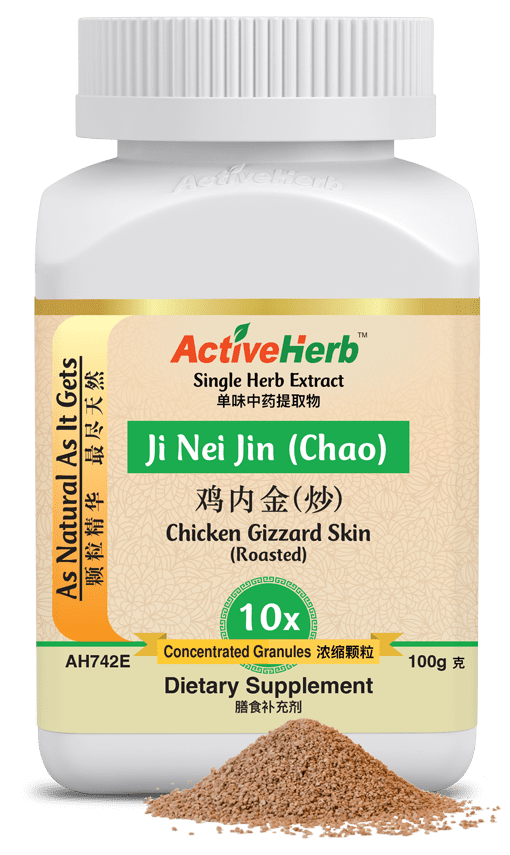Ji Nei Jin: This Curious TCM Ingredient Tastes Like Chicken, Because It Is (Chicken Gizzard Skin)

Fun fact: chickens have no teeth.
So how do our feathered friends digest grubs, worms, other insects and grains?
Chickens have a two-part stomach. The second part is called the gizzard, a muscular internal organ with a firm, chewy consistency that functions as a food grinder. A worldwide delicacy — enjoyed fried in the Deep South — chicken gizzards appeal to those who enjoy meatier, more substantial cuts. When prepared correctly, gizzards become oh-so-tender.
If you’ve never eaten a chicken gizzard or can’t stomach the thought of eating one whole, you can start by consuming a neutral-tasting supplement. (It doesn’t taste like chicken.) For centuries, gizzards have been a staple not just in Chinese kitchens but also as an ingredient in Traditional Chinese Medicine.
But how did the ancients have that eureka moment, realizing the health benefits of this muscular, sandpaper-like organ that helps chickens break down their food? What about Ji Nei Jin, aka roasted chicken gizzard skin, makes it a popular TCM ingredient?
Ji Nei Jin in TCM: The Origin Story of Chicken Gizzards
To discover how ancient Chinese villagers thought to use such a curious ingredient for medicinal purposes, let’s turn to the Doctrine of Signatures.
The Doctrine of Signatures suggests that the physical characteristics of plants, animals, or other substances resemble the organs or ailments they can treat. In the case of Ji Nei Jin, ancient Chinese practitioners may have made several key observations about the gizzard’s function and structure that influenced their understanding of its medicinal properties.
The ancients likely observed chickens scratching and pecking through the dirt. A familiar sight in every village, chickens are hard to miss, consuming pebbles and seeds, seemingly digesting the hardest of materials easily. Because of how in tune with nature the ancients were, they began to understand the unique power of the bird’s digestive system. Although they couldn’t see the gizzard because it’s an internal organ, they realized that something inside them must help them pulverize food. (Some people mistakenly think the gizzard is the whimsical organ that dangles from the bird’s neck; that’s the wattle.)
Over time, this small but mighty organ—the tough lining of the gizzard—became a treasured ingredient in Traditional Chinese Medicine. Here’s why, based on the Doctrine of Signatures.
Digestive Function
Ji Nei Jin’s main selling proposition is its ability to support digestion. After all, the gizzard breaks down hard, fibrous food, including grains and seeds. Ancient Chinese practitioners might have reasoned that because the gizzard performs such a critical role in digestion for the chicken, its inner lining (Ji Nei Jin) would also aid human digestion, breaking down food accumulations and stagnation in the digestive tract.
Grinding Power and Accumulation Breakdown
The gizzard can grind tough materials like seeds and small stones. “So why can’t it also dissolve hard accumulations in the human body?” the ancients wondered. To this day, Ji Nei Jin is given to people who have accumulations in the kidney or gallbladder meridians. Observing how the gizzard prevents blockages in a chicken’s digestive system, ancient Chinese herbalists would have applied this principle to human digestion and stagnation, using Ji Nei Jin to dissolve blockages and masses in the human body.
Preventing Leakage
Because the inner lining of the gizzard is tough, durable, and elastic, the ancients may have concluded that these properties could strengthen or stabilize bodily systems like the bladder. And centuries later, Ji Nei Jin continues to support urinary function and prevent unwanted noctural emissions. It’s no wonder that it’s given to kids and the elderly in China to prevent bedwetting. In addition, by supporting the Kidney organ system, Ji Nei Jin preserves the essence of life (Jing).
More Than A Deep Fried Delicacy: Ji Nei Jin in TCM
An internal organ of an animal that promotes digestion by breaking down food stagnation, dissolves bodily accumulations, and supports urinary bladder function? Who would have thunk it? The sages in ancient Chinese rural villages. And if you’re still feeling a bit queasy about consuming roasted chicken gizzards, consider the humble chicken isn’t the only animal with a gizzard. Crocodiles, alligators, and earthworms have them, too. Just be thankful the ancients didn’t choose crocodile gizzard soup as the remedy of choice!
So try Ji Nei Jin if you want to support digestion and/or your urinary tract system or if you have accumulations. Thanks to ActiveHerb.com extract granules, Ji Nei Jin doesn’t taste like chicken.
Do you use Ji Nei Jin for TCM? Leave a comment below.







